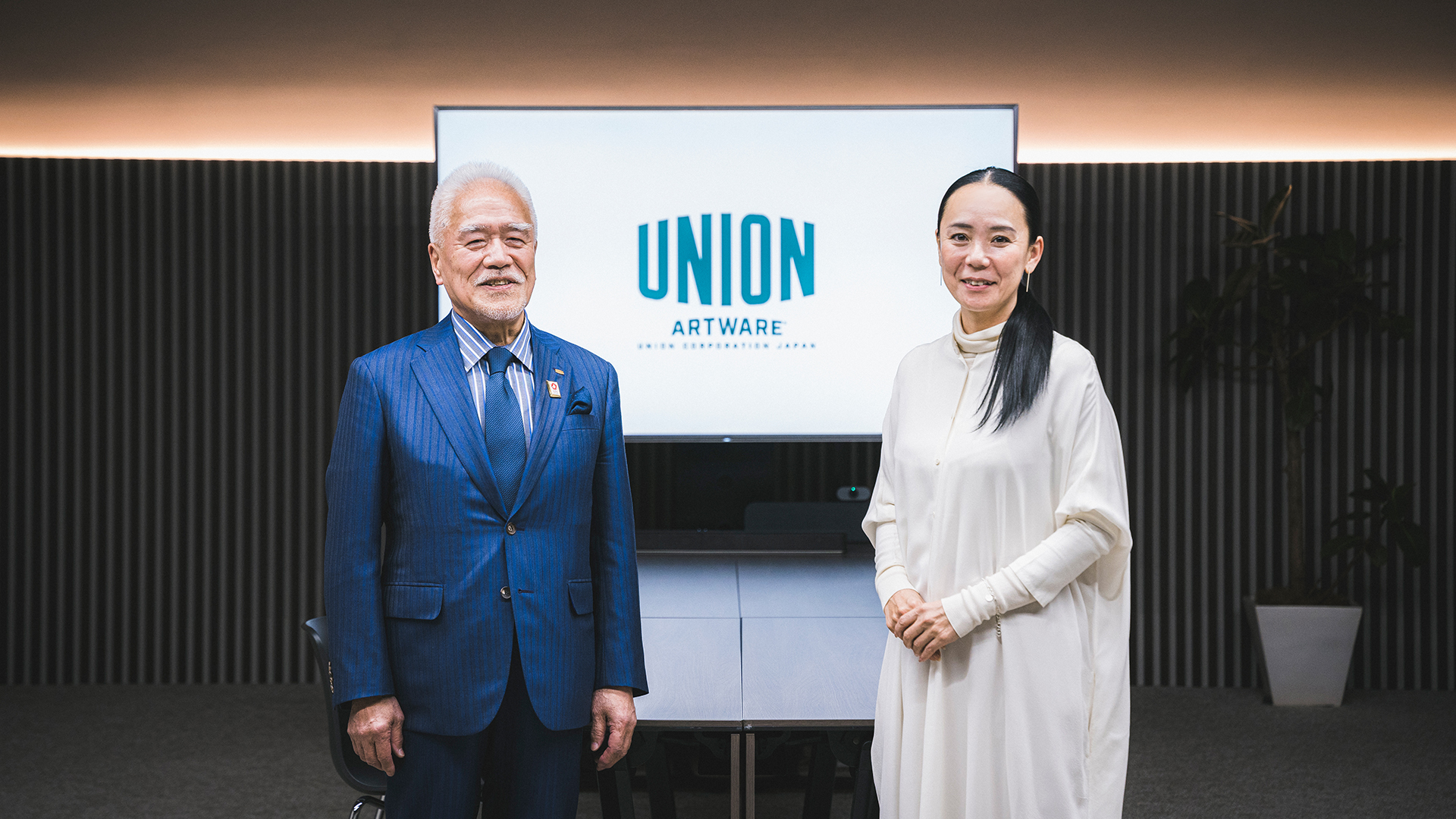
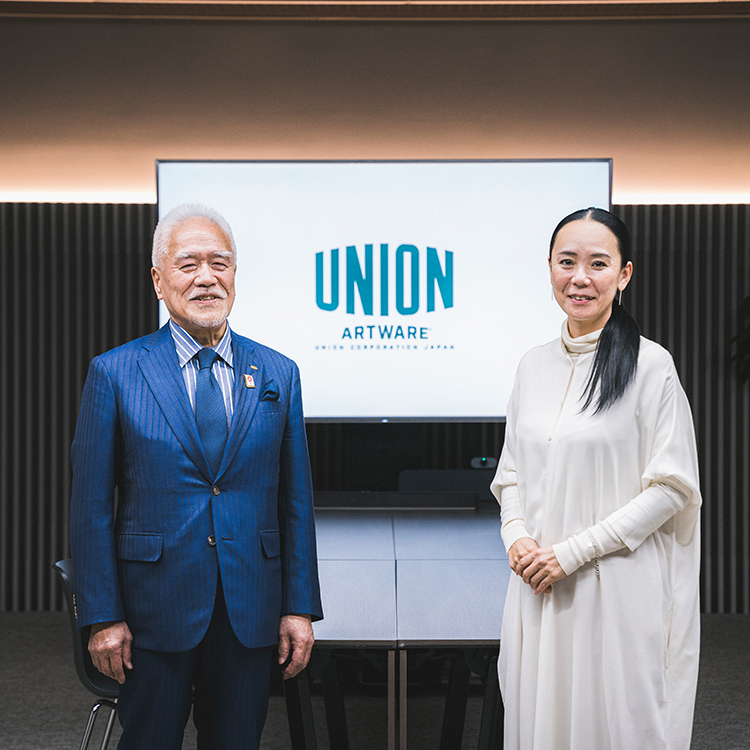


Junzo Tateno
CEO of UNION Corporation
Born in 1947, Junzo Tateno graduated from the Faculty of Law at Konan University (Kobe, Japan) in 1970
and entered Aoki Construction that same year. He joined UNION in 1973 and became CEO and President in 1990.
He serves as Chairman of the Union Foundation for Ergodesign Culture, a Public Interest Incorporated Foundation,
and the Osaka Industrial Bureau. He is also Vice Chairman of the Osaka Chamber of Commerce and Industry.
Naomi Kawase
Director
Based in Nara, where she spent her formative years, Naomi Kawase is a director actively involved in filmmaking. In her pursuit of "reality," her work goes beyond the genre of documentary fiction, and she has received numerous awards at film festivals around the world, including the Cannes Film Festival. While expanding her field of expressive works globally, Kawase also established the Nara International Film Festival in her hometown of Nara, Japan in 2010 and has been focusing on fostering the next generation of filmmakers. From 2018 to 2019, a major exhibition on Naomi Kawase was held at the Centre Pompidou in Paris. Kawase was also general director of the official film for the Tokyo 2020 Olympic Games as well as a producer of and senior advisor to the 2025 Osaka-Kansai World Expo. Her other roles include chair of the Women' s Japan Basketball League and UNESCO Goodwill Ambassador. She continues to be active in a wide range of genres, such as writing essays and directing commercials, and is a mother of one who grows vegetables and rice in her private life. (Quoted from http://www.kawasenaomi.com/kawase/)
17
TATENO
I know you are a filmmaker, but unfortunately, I am not in the habit of going to the movies and only watch them on the plane when flying overseas. I am, however, familiar with the types of films you are involved in directing.
KAWASE
Thank you.
TATENO
You are from Nara Prefecture, correct?
KAWASE
Yes, I am from Nara City, Nara Prefecture. My first film to win an award at Cannes in 1997 was Suzaku, which was shot in Nishi-Yoshino, Nara Prefecture, so people often mistakenly think I am from Yoshino. This film was made around 26 years ago.
TATENO
You won that award when you were quite young, didn’t you?
KAWASE
That’s right. I was the youngest Japanese person to ever win the Caméra d'Or (New Director Award). We went to Nishi-Yoshino to shoot the film and discovered that some of the people living in Nishi-Yoshino live off the water of this river.
TATENO
Is that right? They survive on river water?
KAWASE
I was born in an age when all you had to do was turn on the tap and hot water would come out, so this was a bit of culture shock for me. They said that when it rains the water becomes muddy, so you need to make sure you fill up your tub when you sense rain coming, or you’ll end up taking a bath in muddy water. When I asked whether the water is safe to drink, some of the older men said “it does have tanuki and fox pee in it, but otherwise it’s completely safe.” *Laughs.*
TATENO
*Laughs.*
KAWASE
I was impressed by the villagers’ resilience. It made me think about how this is the way humans have coexisted with nature since long ago. We have evolved while working to live ever safer and more comfortable lives, but have forgotten that we were once a part of nature. With the ongoing development of computers, people are beginning to mistake the virtual world for the real world. If this phenomenon continues, I fear that the flesh-and-blood relationships between humans will become weaker in the future.
TATENO
Indeed. As we become richer, we seem to be losing our sense of humanity.
KAWASE
I think it is inherently human to seek warmth and spiritual richness. If the warmth in our relationships fades away, we are left with loneliness. I feel that social phenomena, such as the increase in suicides we see today, are the byproduct of our development. Some of my films have focused on the theme of being poor but at the same time rich in other ways.
TATENO
I see. I’m actually planning to visit Yoshino this year.
KAWASE
Is that right!?
TATENO
One of my younger classmates from university is in Yoshino. Both Yoshino and Ikoma are nice places filled with a lot of nature. In the past, I often saw many wild animals, like weasels and snakes, but not so recently. Maybe an imbalance is starting to form as we see nature disappearing?
KAWASE
I feel that wild animals are being driven away as mountainous areas and residential neighborhoods are developed, which causes damage to the surrounding fields. When we promote development that is human-focused and lacking in balance, then disruptions inevitably occur, and this eventually comes back to haunt us.
TATENO
Well said.
KAWASE
An older man in the village of Nishi-Yoshino once told me that, even if they somehow ran out of money and couldn’t make a living, they would still have this land to themselves. He said that if they decided to cultivate the land they could still grow potatoes or whatever else they needed. This, to me, is basically what it means to live. But to make money, everyone goes to cities. Money carries value thanks to the economic activities we engage in, but as living beings, we are supposed to grow rice and potatoes, consume them, and share them with our neighbors, so we can all help each other out and survive. If we mistakenly believe that anything can be bought for a price, we are in big trouble in the future.
TATENO
We live in a time when prices are now soaring, and the number of things you can’t buy, even if you have money, is increasing
TATENO
Some time ago, I met someone from Save the Children, and after receiving the support of a great many people, I established Save the Children Japan. When the organization was established 30 years ago, Japan was a wealthy country with very few underprivileged children. So we decided to provide support to children overseas, and ended up giving assistance to various regions, such as Vietnam and the Philippines’ Smoky Mountain. Now, however, Japan is becoming more and more disadvantaged. A major issue we face moving forward is thinking about how we will support Japanese children in the future.
KAWASE
I think it is really important to turn our eyes to the world at large and think about how we can best provide support. On the other hand, we also have to think about our own country, as there are many households facing various harsh circumstances in places hidden from sight in Japan.
TATENO
I agree.
KAWASE
In 2020, I made the film True Mothers, which centers on the story of a special adoption. People who engage in special adoptions are praised in the public eye because they are doing something good, but behind the children who are being adopted, there are always parents with many problems. In fact, teenage pregnancies themselves are an issue. These young mothers are unable to turn to anyone, and missing the chance to get an abortion, they end up abandoning the child after giving birth or engaging in various other problematic behaviors.
TATENO
I’ve even heard of mothers who abandon their babies in lockers, having no one to rely on.
KAWASE
It’s sad. The organization that facilitates special adoptions is meant to protect such mothers and connect them with families who are unable to conceive children. The birth mother I depicted in my film was a 14-year-old girl. The memory of giving birth to a child remains stored within her body, but society acts as if this never happened. This, in turn, becomes a form of emotional trauma for her, and she is no longer able to stay at home, instead choosing to live on her own in the end. The years that follow are very painful ones for her.
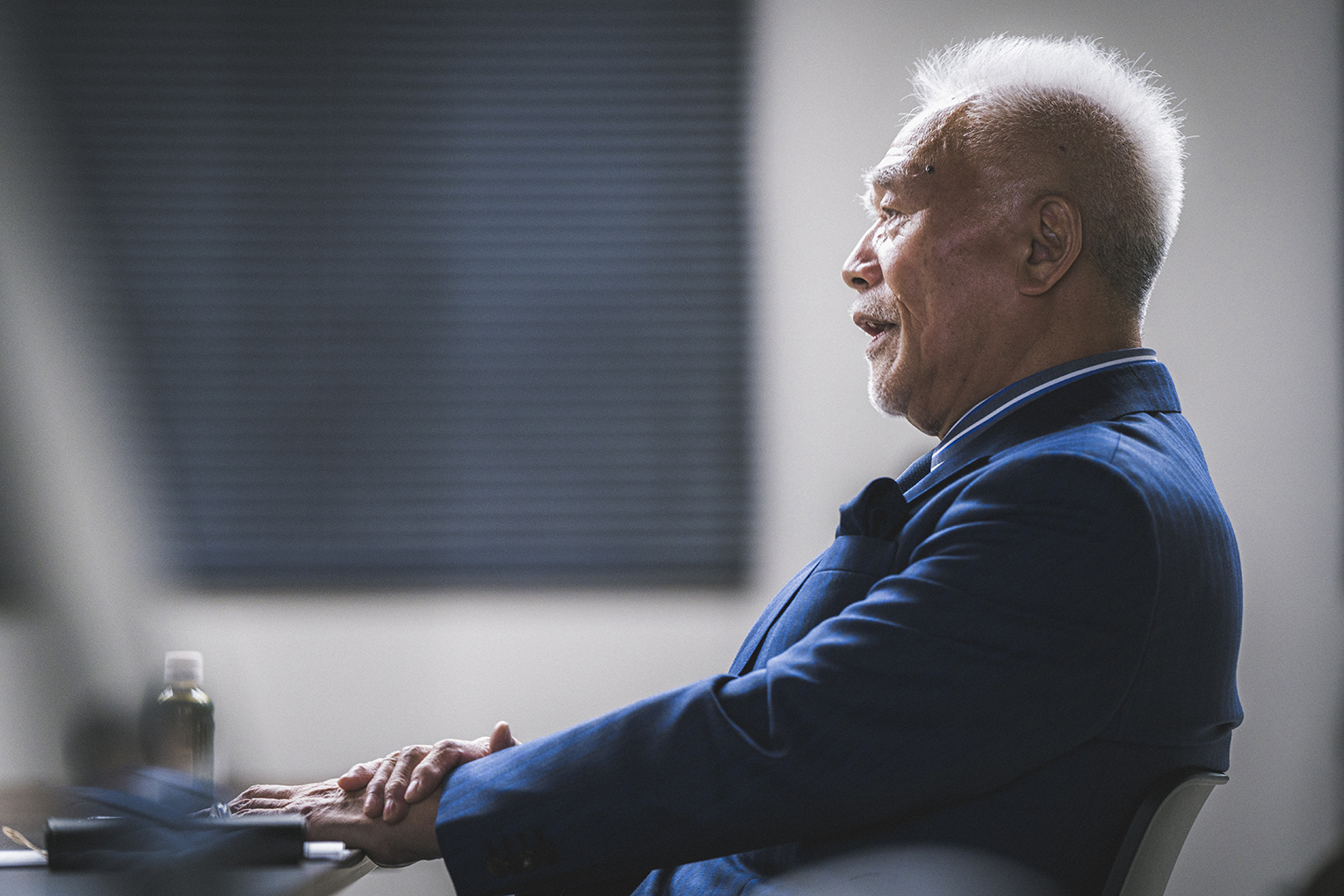
TATENO
I see.
KAWASE
I wondered, then, at what point could we have saved a child like her. If she were to confide to those around her that she was pregnant, one can imagine that she would become the target of bullying at school. Society and local communities are too intolerant of people once they have failed, making it hard for them to live.
TATENO
What kind of response have you received from people who saw this work?
KAWASE
It seems a lot of the men who watched it were quite shocked. They did not seem to know that there were girls around with such problems. Among the men who expressed such opinions, some felt that there was something they could do to help, and others believed that if they could muster the courage to reach out, they could save girls in need like the one depicted in the film. I was surprised by the many responses I received.
TATENO
I, myself, wish the men who felt that way would take action.
KAWASE
Me too.
TATENO
It’s not enough to be moved; one must take action. If we could get even one more person to do that. I think the world would start heading in a better direction. Take the architect Tadao Ando, for example. He is a man of action. In 2020, he created a library for children called “Nakanoshima Children’s Book Forest.”
KAWASE
People like Mr. Ando, who have achieved something through their own efforts, serve as an example of success and have built solid relationships of trust with people, which may provide the backdrop against which they can take action.
TATENO
This is true.
KAWASE
In this day and age – especially now I believe – those who have the courage to stand up and take action are often maliciously aligned by the media in an attempt to pull them down. Today, people actively spread both truth and lies in magazines and on the internet in an effort to bring down others. The world has, above all, become one in which people can be easily entrapped. This is why I believe everyone has become reluctant to take action.
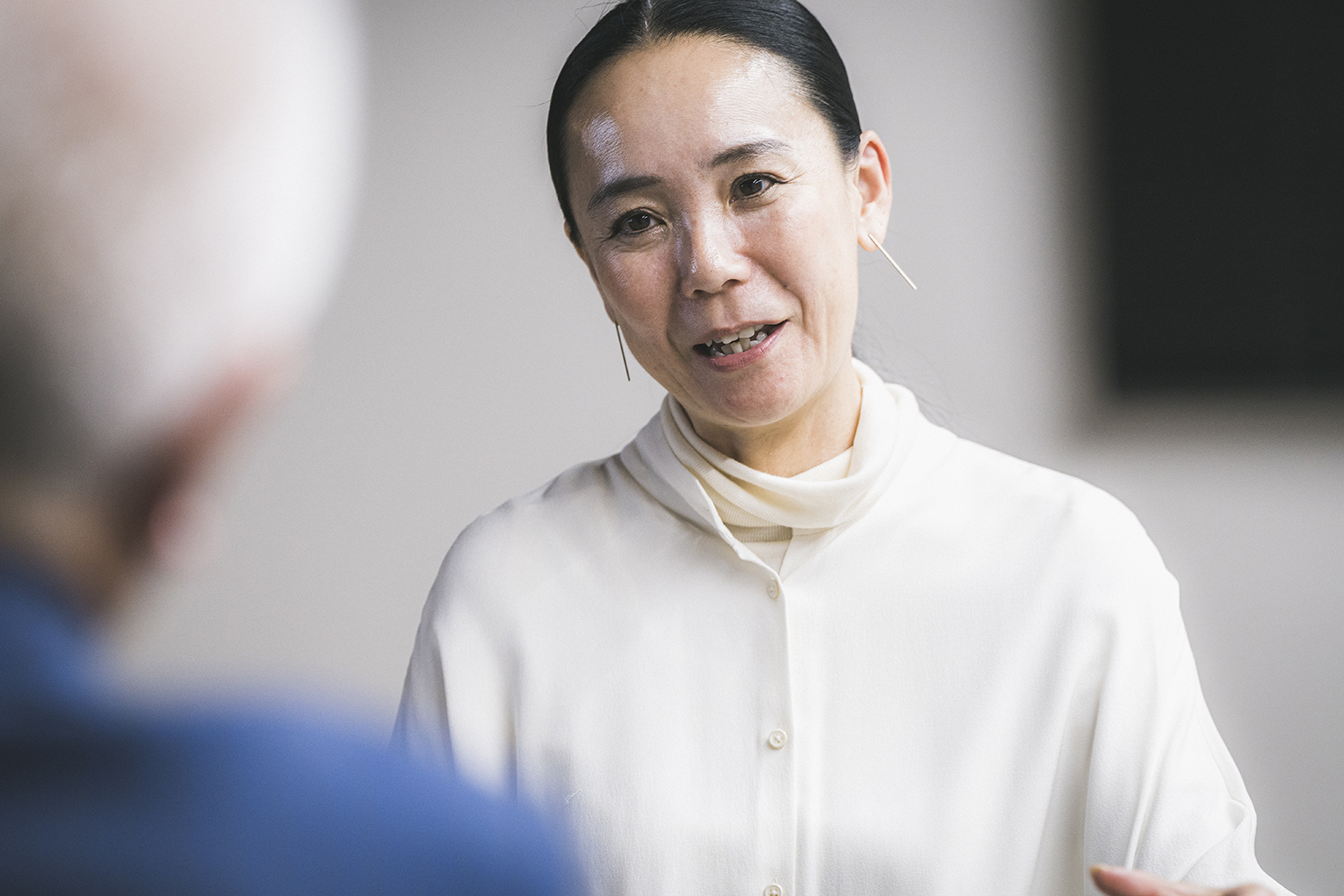
TATENO
This is true. I feel such trends have become more and more prominent in recent years.
KAWASE
I just remembered this, but when I was filming at Todaiji Temple, I greeted the temple staff with “sorry to trouble you,” to which they replied “people are meant to be troubled.”
TATENO
Is that right?
KAWASE
They told me that when people attempt to do something, they inevitably cause trouble for each other, so not to worry about it. I was in my twenties at the time, but when they told me this, I realized that actually I could do my best without worrying about causing trouble for others. This is why, now, I want younger generations to really give it their all.
TATENO
I agree.
KAWASE
Humans make mistakes. What’s important is thinking about how we will overcome our failures and deal with those to whom we have caused trouble. There may be times when we run away or repeat the same mistakes, but the older generation should support us in our efforts. Such a cycle may be necessary for us to advance in the end.
TATENO
It’s just as you say. We must put more effort into cultivating the youth who will bear responsibility for the future. We should be focusing on how to draw out people’s individuality in education. Instead, education based on uniformity has persisted.
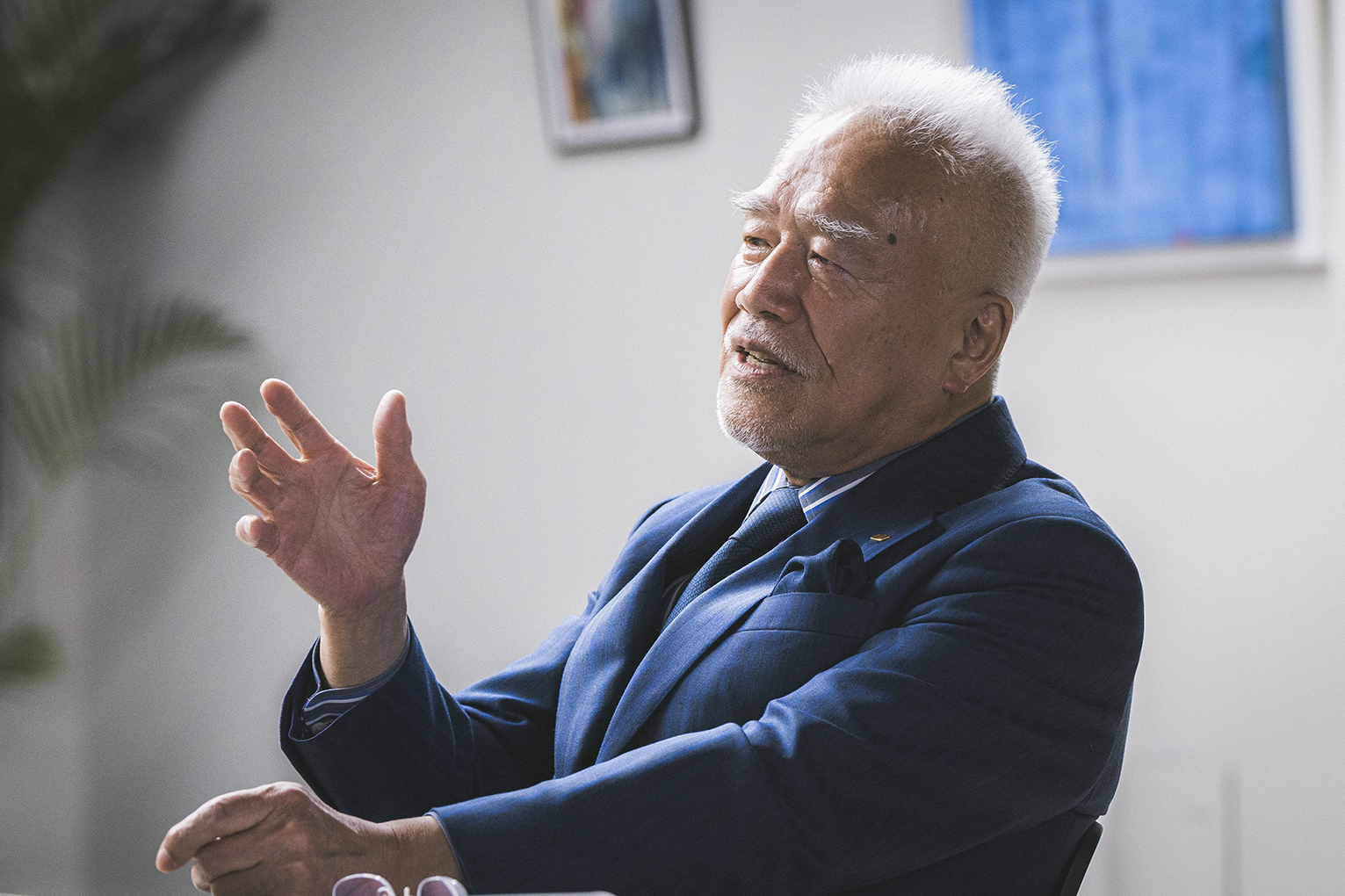
KAWASE
Like by treating everyone as if they are equal.
TATENO
Yes. Some people are good at studying and others are not. This should be fine, no? In discovering our individuality, we get divided into those who can persevere and those who fall short. I believe that individuality is required to do the job of say a director, so it is essential that we educate people so they are better able to develop the individuality that lies within.
KAWASE
That’s right.
TATENO
To achieve such an education, class sizes of 40 students are way too big, and children will get overlooked. We need to limit classes to around 20 students and carry out intensive education to bring out and polish each student’s unique character.
KAWASE
In Japanese society, people who work in jobs that drive the country’s economy tend to have studied very hard during their school years. What is certainly lacking in this type of education is time spent studying about culture and the arts.
TATENO
In Japan, there are fewer people than in the West who actively go to museums. Art and fine arts seem to not be as familiar to the everyday people here.
KAWASE
When you go to museums in Europe, you see students and small children sitting down and sketching amongst the exhibits. It’s really a surprising sight.
TATENO
It surprised me at first as well.
KAWASE
Japanese art museums only allow visitors to view genuine, world-class works of art from a distance after the works have been placed inside showcases. Meaning, they afford few opportunities to experience genuine works of art firsthand. Japan is a country with a long history, and there are many valuable works among its collections, but the threshold for experiencing genuine works of art is extraordinarily high. As a result, future generations – including us – are unable to enjoy the precious essence of this art.
TATENO
It’s a waste, isn’t it?
KAWASE
It really is. What’s more, there are far too few opportunities to hear directly from those who have mastered a craft, when it comes to the arts. I don’t believe that education is something we can only get in schools. In your younger days, teachers were the be-all and end-all, weren’t they?
TATENO
That’s right.
KAWASE
Teachers should not simply tell students what is written in the textbooks without focusing on education that develops their human abilities. In fact, I believe that school is a place where students cultivate their skills as people through interacting with their friends and teachers.
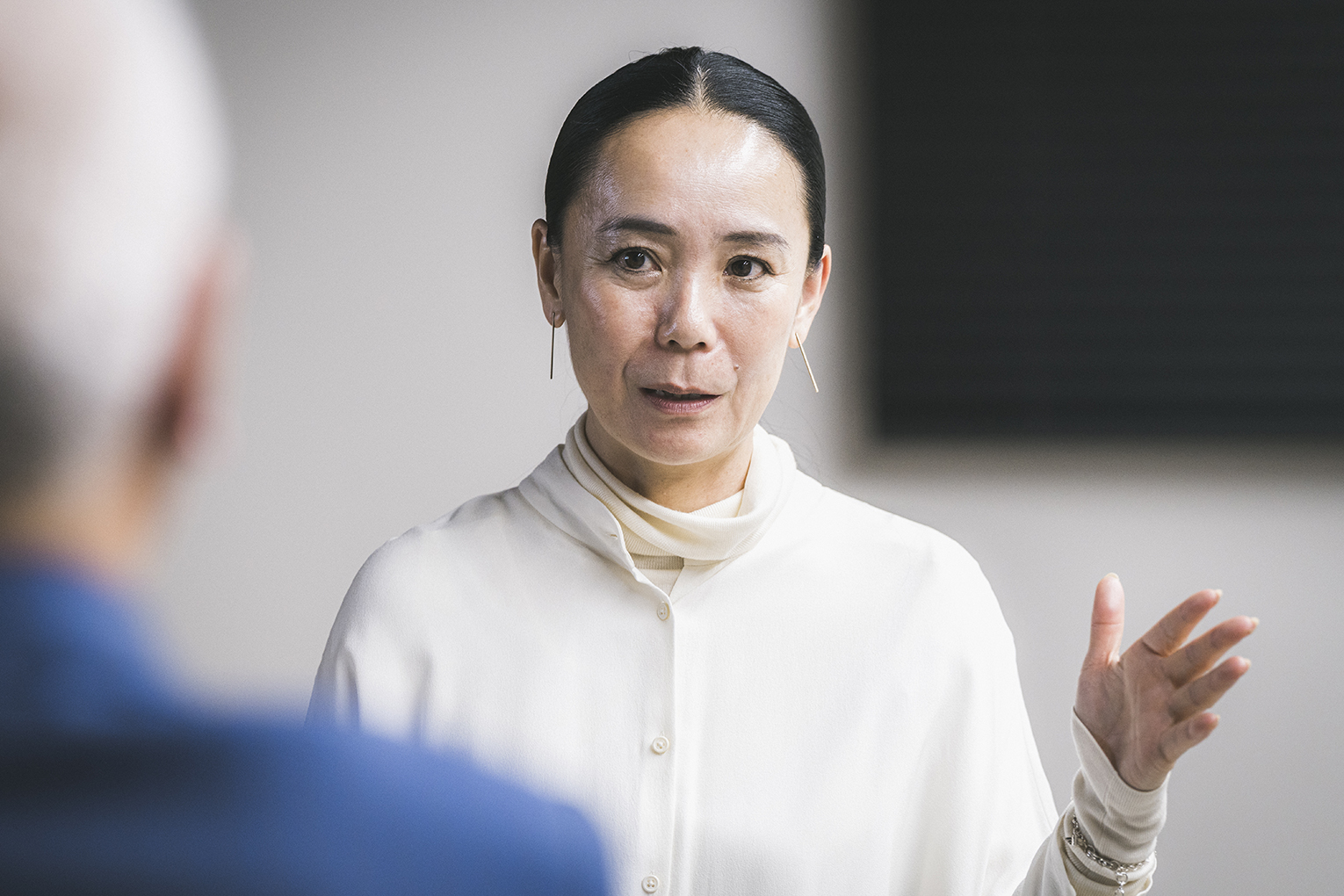
TATENO
As can be inferred from the scenes witnessed at European museums, this leads to a fundamentally different aesthetic sense and way of thinking in the first place.
KAWASE
It is also important to respect diversity. If a child is bad at running but good at drawing, then we should encourage and foster that student’s drawing skills. I may be particularly sensitive to this since I work with people in the arts, but students who are really skilled drawers in kindergarten often lose this ability when they enter elementary school. They are told that they have to draw a certain way and lose their desire to do so because they no longer have the freedom to create art as they like. I think it would be better if we let their sensibilities blossom more in their earlier years, before educating them on theoretical matters later, for example.
TATENO
I agree. Early childhood experiences are essential to cultivating one’s sensibilities.
TATENO
I recently watched a program on Leonardo da Vinci and was very impressed. I was amazed at not only how he recognized the existence of Earthlight but also at how he drew an incredibly accurate map of the city of Milan from a bird’s eye view.
KAWASE
Speaking of da Vinci, he was also associated with the field of architecture.
TATENO
He was. He really covered everything, from civil engineering to medicine and science. Da Vinci was truly a man of genius.
KAWASE
I actually wanted to become an architect.
TATENO
Is that right!?
KAWASE
Yes. I spoke of this to the architect Sousuke Fujimoto, but there was a da Vinci exhibition at the Louvre just before the pandemic started, and several of his actual works that had still survived were on display. Among those were some of his works related to architecture, and their precision was truly impressive. I found him very similar to Kumagusu Minakata of Japan.
TATENO
Minakata was also a genius. In order to nurture such geniuses, we really have to rethink the nature of education.
KAWASE
I agree. At times, it may be important to conform to what is considered normal. If everyone did their own thing, the world would fall into chaos. That said, that which sticks out from the ordinary is what makes us unique. I think it is also important to recognize that.
TATENO
It may be especially necessary if your goal is to become a film director.
KAWASE
I was sort of a strange child, which is mostly due to the fact that I was filled with the desire to live outside the box. As you mentioned earlier about da Vinci’s map, I too seemed to have looked at things from a bird’s eye view in my head starting from a young age.
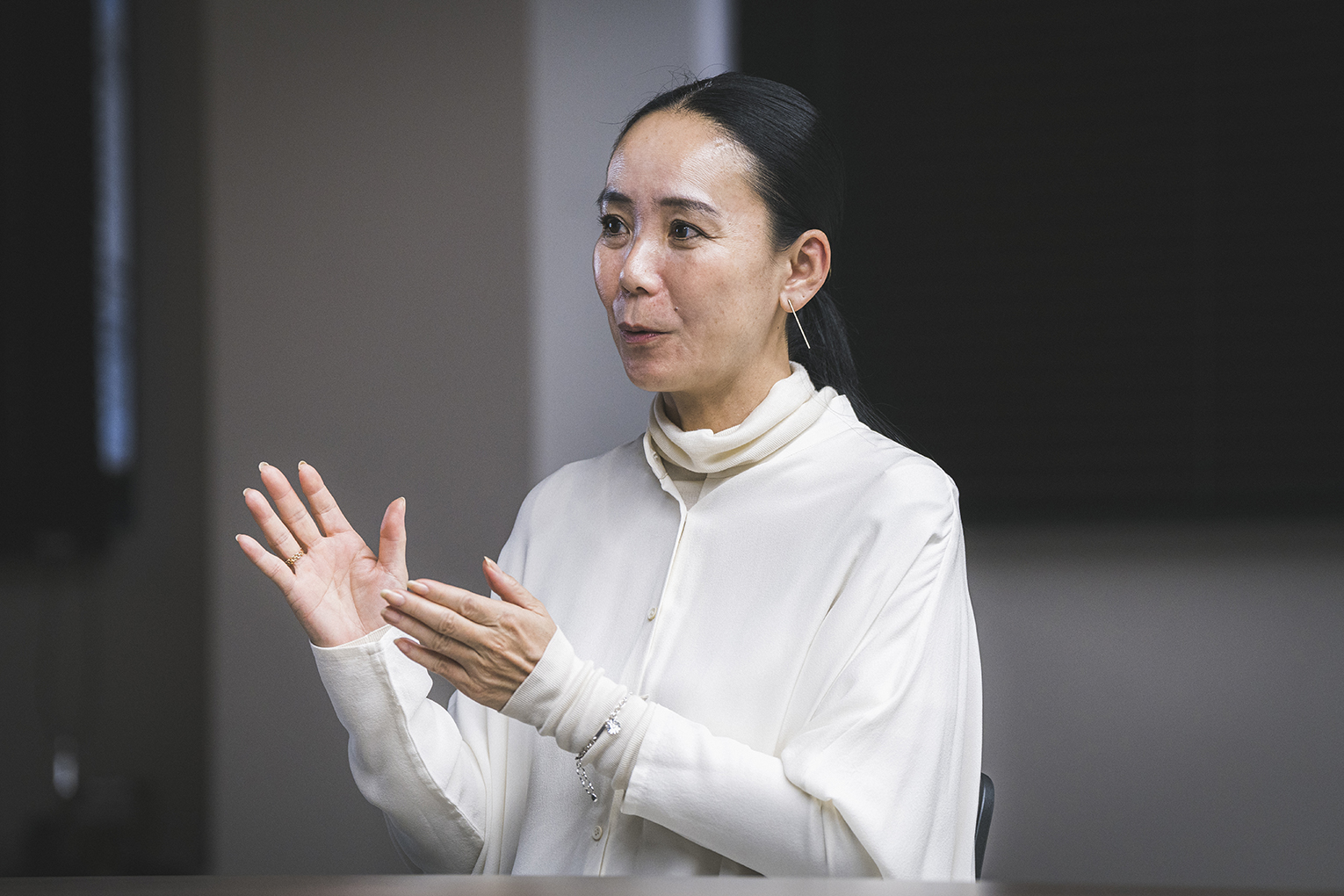
TATENO
Is that right? Was this something you naturally did before you were aware of it?
KAWASE
Yes. When explaining the way to get somewhere to someone, I would do so in incredible detail, which would lead people to ask how I could remember so much. It was as if I had taken a picture of the scene in my mind.
TATENO
Meaning?
KAWASE
It’s like images are stored in my head just like photographs, and I can view them in my mind as I speak. This is why I am so quick to be able to put scripts into writing. I don’t think of things in words but rather as pictures or images, and I am able to assemble the story together accordingly. If I’ve assembled the images in my mind, it doesn’t even take me a week to put it down into writing.
TATENO
So your scripts are made a bit differently?
KAWASE
As I have to submit the script to the offices of the actors who will take part in the film as well as run it by the producers, I write everything out. But most of the time, the filming doesn’t go as scripted, and I’ve even been known to tell the actors on set to forget the script entirely for a moment. *Laughs.*
TATENO
*Laughs.*
KAWASE
All I ask is that they be there and completely become the part. That’s enough. Also, I ask them to take care of their own props.
TATENO
At their homes?
KAWASE
Yes. In doing so, they become attached to them, and although this may not be visible in the film, I tell them that their emotions live on within these props. The workings of the film’s staff is very important during filming as well. For example, I ask the costume and makeup crews to report to me on the current emotional states of the actors.
TATENO
Is that right?
KAWASE
If I know that so-and-so actor is feeling this way today, then I can appropriately decide the entrance to the next scene. If I can ascertain the actor’s emotions and proceed with the script just as it is, I will, but if that is not the case, we will instead have a discussion or I will hand off notes while the camera is rolling, and we will weave together their emotions based on that.
TATENO
The energy that actors use to play their roles truly is immeasurable, isn’t it?
KAWASE
It really is. It is important for the staff to be prepared for all possible scenarios that may arise and to be ready to respond to whatever the director may ask for.
TATENO
So you have gathered together a team of staff that are very flexible, I take it?
KAWASE
For my main staff, I have regulars who are in charge of direction, audio, and lighting. I’ve heard that even after Akira Kurosawa passed away, his team was still able to film Kurosawa-esque films. They must have understood just what Mr. Kurosawa would have done to film a given scene even in his absence.
TATENO
So a film is created not just by the director, but with the support of the entire team.
TATENO
I’ve heard that fundraising is quite difficult when shooting a film.
KAWASE
It is. The entertainment industry is premised on getting back the money that was originally spent, but with the recent development of content distribution, the number of people going to see movies in theaters is decreasing.
TATENO
This is true.
KAWASE
Movie theaters, like the Meigaza, are rapidly disappearing.
TATENO
So the current situation is quite a troubling one, isn’t it?
KAWASE
It is. Changing the subject for a second, I actually grew up without knowing my parents. My first memories are of being adopted into the home of a childless elderly couple. Due to this fact, I don’t really know where I came from originally. In the past, it was quite agonizing not knowing why I was born.
TATENO
Is that right?
KAWASE
It was at this time that I discovered the world of film, or to be more precise 8mm film. Rather than shooting film itself, I was attracted by the idea of projecting this world to others. Time passes, we all get old and eventually die. If you make a film, you leave behind a legacy, and I thought that was an amazing thing. I used to think of my origins as something negative, but I realized that I could transform it into something positive through film. When the wheels of my real life and my film life started to move in unison, that’s when I finally started to feel alive.
TATENO
So your films ran parallel to your life in a sense?
KAWASE
Yes. Since film was something that enriched my life, it became the focus of my life’s work, which was more important than how much money it cost or how much it could make me. I was so happy to find meaning for the everyday life I was born into just by filming the present moment with 8mm film. Usually girls in their twenties enjoy fashion or go shopping with their friends, but the second I got my hands on some money, I spent it on film and began shooting away.
TATENO
I see. So it was this original life experience that you had that gave birth to the director you became?
KAWASE
Yes. The first independent film I made was about finding my father and was titled Embracing. It was a 40-minute, 8mm documentary film that was not released in theaters. After that, my film Katatsumori, which was about my adoptive mother’s everyday life, got picked up by an international film festival, which led me to eventually writing the screenplay for Suzaku.
TATENO
So that’s how it unfolded.
KAWASE
When my adoptive mother passed away at age 97, I felt that I was alone without anyone by my side in life. At that time, I suddenly decided to look up my family register to see where I would end up. In doing so, I found myself on Amami Oshima Island.
TATENO
Amami Oshima? Not Nara?
KAWASE
It’s strange, isn’t it? I grew up in Nara, a prefecture surrounded entirely by land, but when I looked up my family register, I realized my roots were in an island entirely surrounded by sea. When I visited Amami Oshima after discovering this, I asked a person still living in the village about my origins and they told me “I know you! You are so-and-so’s great-great-granddaughter.”
TATENO
That’s amazing!
KAWASE
As Amami Oshima Island was ruled by both the Ryukyu Kingdom and Satsuma Clan, they have an attitude of “we neither refuse what comes to us, nor chase what goes.” They say “welcome back” to visitors, and are even more inviting to those related to them by blood, treating them as close relatives.
TATENO
You must have been so happy to experience that.
KAWASE
I was. What’s more, the film I shot at the village there was officially selected for the Cannes Film Festival.
TATENO
You make films that follow your own life, don’t you? I can understand now why you are not overly concerned with money.
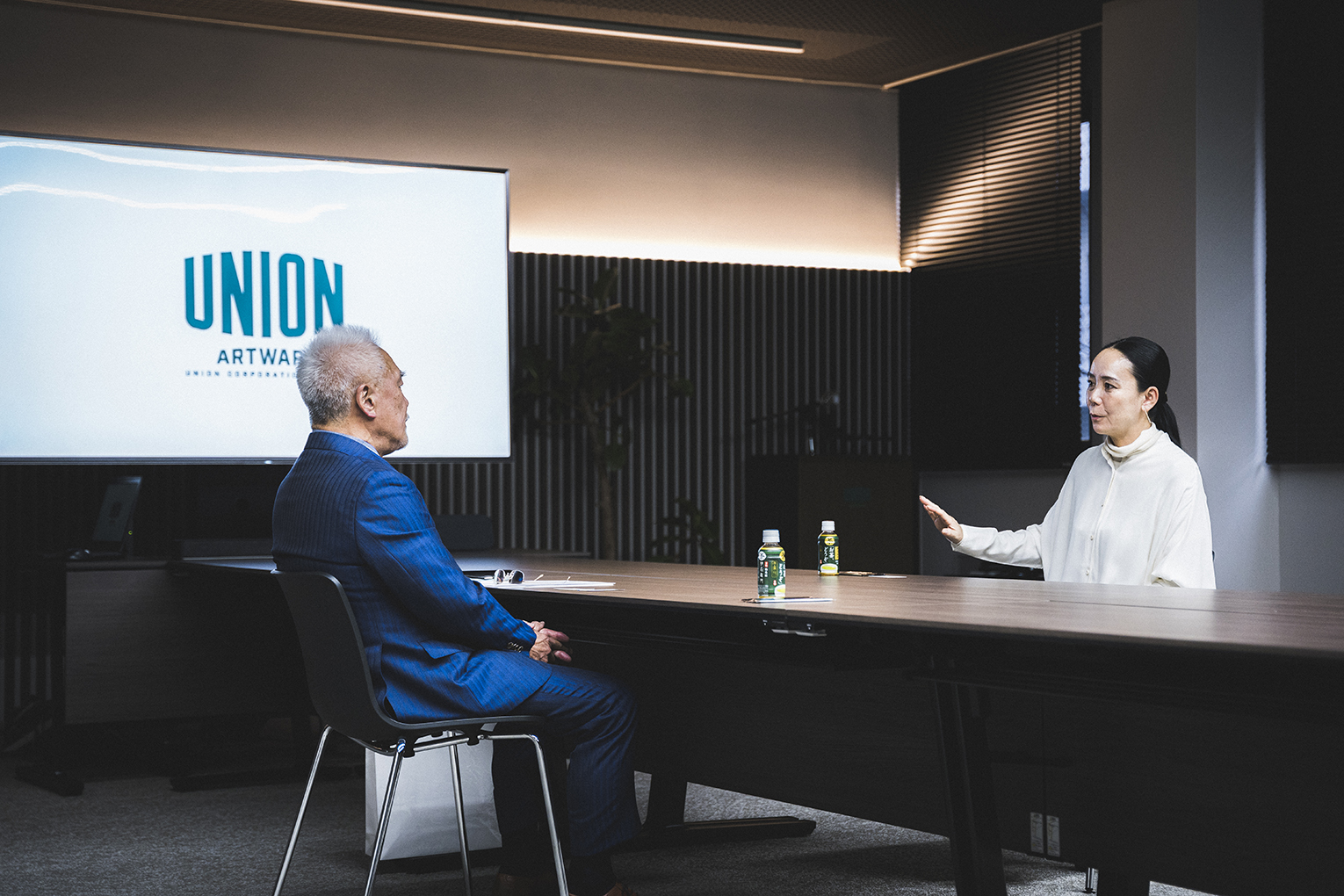
KAWASE
That’s right. While it’s not entirely true that I am totally unconcerned with money, I have got to where I am today by putting my thoughts into action first and foremost.
TATENO
I am sure that these thoughts of yours are conveyed to the audience through your works. That’s why you’ve won the awards that you have.
KAWASE
I was shocked that someone like me, who was raised in Nara and had never been abroad, could win an award at Cannes for a film they shot. Everyone in the Japanese film industry was surprised by this as well.
TATENO
At UNION, we make hardware, mainly door handles, which find themselves as products attached to various forms of architecture. As long as these buildings exist, the products related to them will be there. This is why our employees can be so proud of what they have created. They can show their children a product that they have worked on. This is what manufacturing and craftsmanship are all about. Hearing your story just now, made me realize that we share something in common. We leave behind that which we have created and worked on for the world at large. There is nothing more enjoyable than that.
KAWASE
This is the very reason why I wanted to be an architect. More than architecture itself, I wanted to design environments. Designs found in the bridges we create or mailboxes we install live on after we are dead and gone. And there are people who use these bridges and mailboxes. People make use of and are protected by the spaces around them, which is why I think being an architect is a truly wonderful job.
TATENO
You will be working on a pavilion for the World Expo in 2025. I’m really looking forward to seeing what you will create. Can you tell us a bit more about your pavilion?
KAWASE
The pavilion I will be in charge of will be based on the theme of “Protecting Life.” I had zero expectations in the beginning that one of these pavilions would find their way to me. I humbly accepted the offer and, in fact, had always wanted to create such a space, but in reality, I had never done so, and what’s more, realized I was in the lofty position of producing a pavilion for the World Expo, which had previously been done by the great Taro Okamoto at the World Expo held in 1970. I really was at a loss for how to take on such a challenge.
TATENO
You must have felt a lot of pressure being in this position.
KAWASE
I did. Moreover, the theme of the pavilion is an extremely important one. This is why I decided to revisit the word “protect” and think more deeply about it. The idea I then arrived at related to protecting oneself from enemies or the like. For example, I started thinking about how war and discrimination are a form of enemy that might endanger life. I even thought about how one’s own mind can act as an enemy that exposes one to danger.
TATENO
Interesting.
KAWASE
If we think about the fact that there may be someone just like us within the different races and religions that exist outside our borders, then maybe wars would cease to exist. The reason being that no one would think of killing themselves with malicious intent. So I set out to try and make a pavilion that would carry such a feeling.
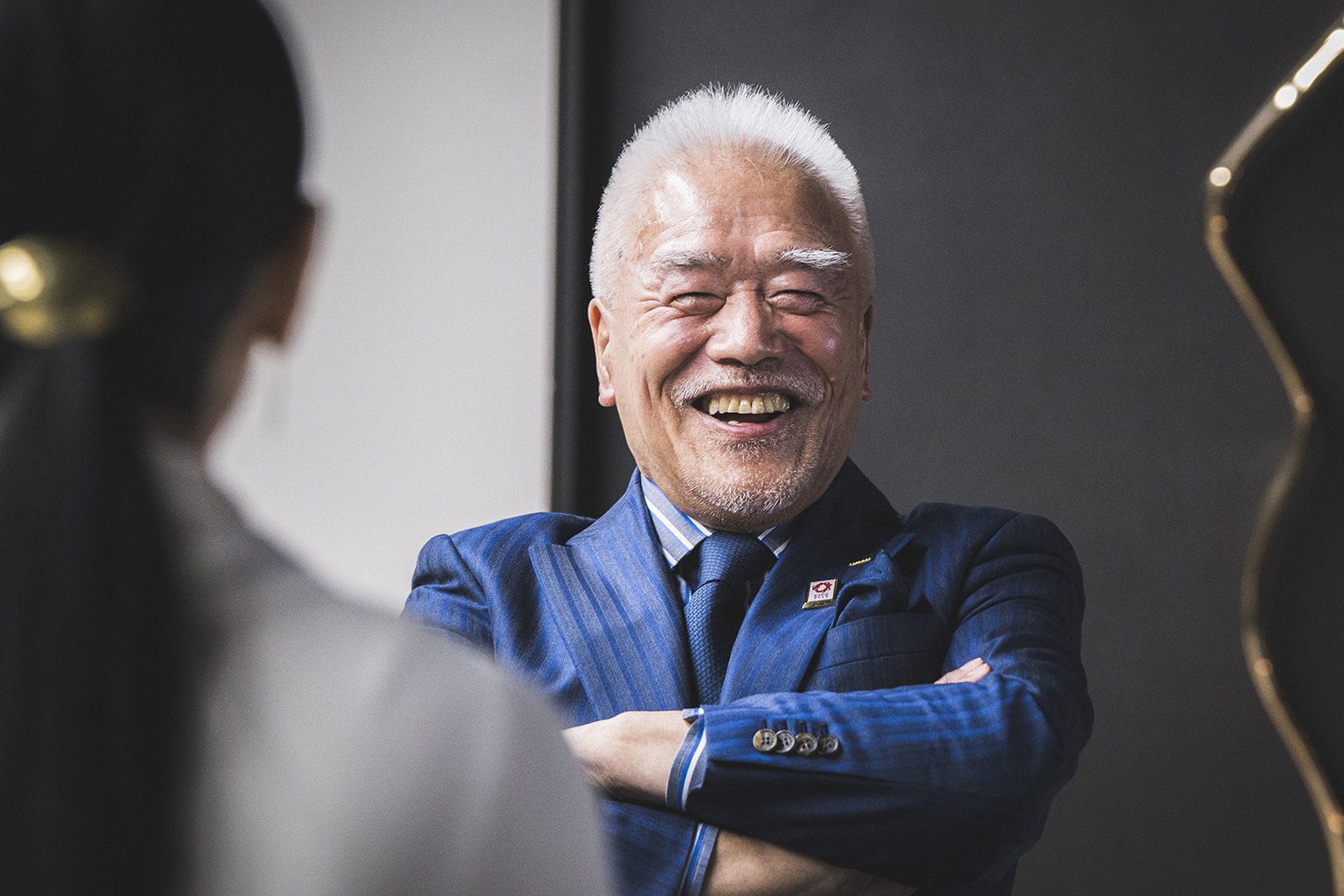
TATENO
That’s amazing!
KAWASE
Thank you. This is just one idea, but I’ve thought about giving balls to the pavilion’s visitors that they could then take home with them to their own country and give to 12 people they know. If everyone who came to the pavilion did this, we would be able to distribute one ball to all 7.8 billion people on Earth as I have calculated.
TATENO
That’s really interesting.
KAWASE
It’s no exaggeration to say that humanity’s ongoing wars are one of the biggest themes for me as an artist. Although it infuriates me at times, I still feel there is a path forward within each of us where we can make progress while honoring and looking out for each other.
TATENO
Yes.
KAWASE
I believe that there is no cycle more vicious than war. I would love to be able to eliminate war through art, but even art has its limits. It was just as I was thinking about this that the war between Russia and Ukraine broke out, and the World Expo was scheduled to be held. Understanding that this expo can provide nothing more than the opportunity to think about such things, I set out to create a space where people can exchange opinions and enter into a dialogue of understanding amidst the various worldviews that exist in our current chaotic era.
TATENO
A dialogue?
KAWASE
Yes. There are no set scenarios in dialogues, and no one knows where the conversation will take them. We will, in turn, look at this space and archive what takes place there.
TATENO
That is going to be one massive archive.
KAWASE
This is why we would like to create a sort of “detached theater” where memories will be archived as a kind of experiment. That said, we are committed to not doing anything wasteful. We do not want to spend an exorbitant amount of money building something that will only be open for six months and then torn down. This is not in keeping with the times, and we have no intention of building a brand new pavilion to begin with.
TATENO
How are you going to create your pavilion then?
KAWASE
We will take apart an elementary/junior high school that has been closed down and relocate it. Architecturally speaking, this presents quite a challenge, but we feel that it is also something entirely new. In a way, we are relocating memories. After the event is finished, we also plan on moving the building somewhere so it can continue to be used.
TATENO
Wow. Now that is really interesting.
KAWASE
Rather than returning it to its original form, I want to breathe new life into the structure’s existence at the World Expo. The 1970 World Expo was largely based on the theme of “Progress and Harmony for Humankind,” but Taro Okamoto was actually against this theme. While the facade of the Tower of the Sun represents a bright future, its back is black and is an expression of the past. One can sense that Mr. Okamoto must have felt a sense of danger in the future ahead. More than 50 years have passed since then, but I hope that the 2025 World Expo still conveys and expands upon the spirituality that the Japanese people have cultivated since ancient times.
TATENO
That’s great. I hope that the pavilion you create for this World Expo will cause children to become aware of something yet unknown to them as well as give them a new sense of hope. During the 1970 World Expo, many children took a great interest in the pavilions, some visiting them multiple times. Since children are the ones who will carry the future on their shoulders, I hope that this event will help them realize the splendor of a world without war and remind them that conflict is, in the end, a futile endeavor.
*Interview concludes*
Both
Thank you very much.
Planning: Naoyuki Miyamoto
Photography: Kesuke Kitaura
Writing: Fumiya Daito
Web Direction: Ryo Kijima